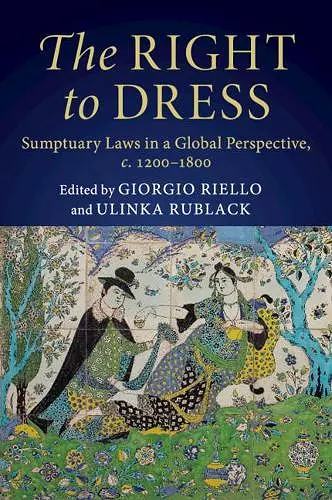The Right to Dress
Sumptuary Laws in a Global Perspective, c.1200–1800
Giorgio Riello editor Ulinka Rublack editor
Format:Paperback
Publisher:Cambridge University Press
Published:13th Feb '20
Currently unavailable, and unfortunately no date known when it will be back
This paperback is available in another edition too:
- Hardback£120.00(9781108475914)

Presents a global history of dress regulation and debates around how human life and societies should be visualised and materialised.
The regulation of dress had a profound effect on global consumption and the shaping of the modern world. Leading scholars reveal why items of dress became aspirational goods, how they were lobbied for and marketed, and how people asserted their right to choose how they dressed as a 'human right'.This is the first global history of dress regulation and its place in broader debates around how human life and societies should be visualised and materialised. Sumptuary laws were a tool on the part of states to regulate not only manufacturing systems and moral economies via the medium of expenditure and consumption of clothing but also banquets, festivities and funerals. Leading scholars on Asian, Latin American, Ottoman and European history shed new light on how and why items of dress became key aspirational goods across society, how they were lobbied for and marketed, and whether or not sumptuary laws were implemented by cities, states and empires to restrict or channel trade and consumption. Their findings reveal the significance of sumptuary laws in medieval and early modern societies as a site of contestation between individuals and states and how dress as an expression of identity developed as a modern 'human right'.
'This brilliant and truly global collection of essays show how ingeniously and even courageously people used clothing to subvert systems of rank, from Paduan dandies arrested for the splendor of their dress to a Mohawk chieftain's self-display in a British frock coat.' Ann Rosalind Jones, Smith College, Massachusetts
'A fascinating view of how especially townspeople of some means received the orders of their superiors, conforming, stridently negotiating the details, or quietly ignoring the rules of dress. In the end, the authors remind us people's right to dress as they please is part of a utopia of liberty that today seems more remote than ever.' Suraiya Faroqhi, Ibn Haldun University, Turkey
'When did clothing become a crime? This collection of essays by leading experts shows how anxiety over expenditure and ownership is a long-standing global phenomena. Ranging across Europe and its colonies, and extending into the Chinese, Russian and Ottoman empires, this book brings to life the complexities of sumptuary laws and their application.' Evelyn Welch, King's College London
ISBN: 9781108469272
Dimensions: 230mm x 153mm x 30mm
Weight: 750g
523 pages